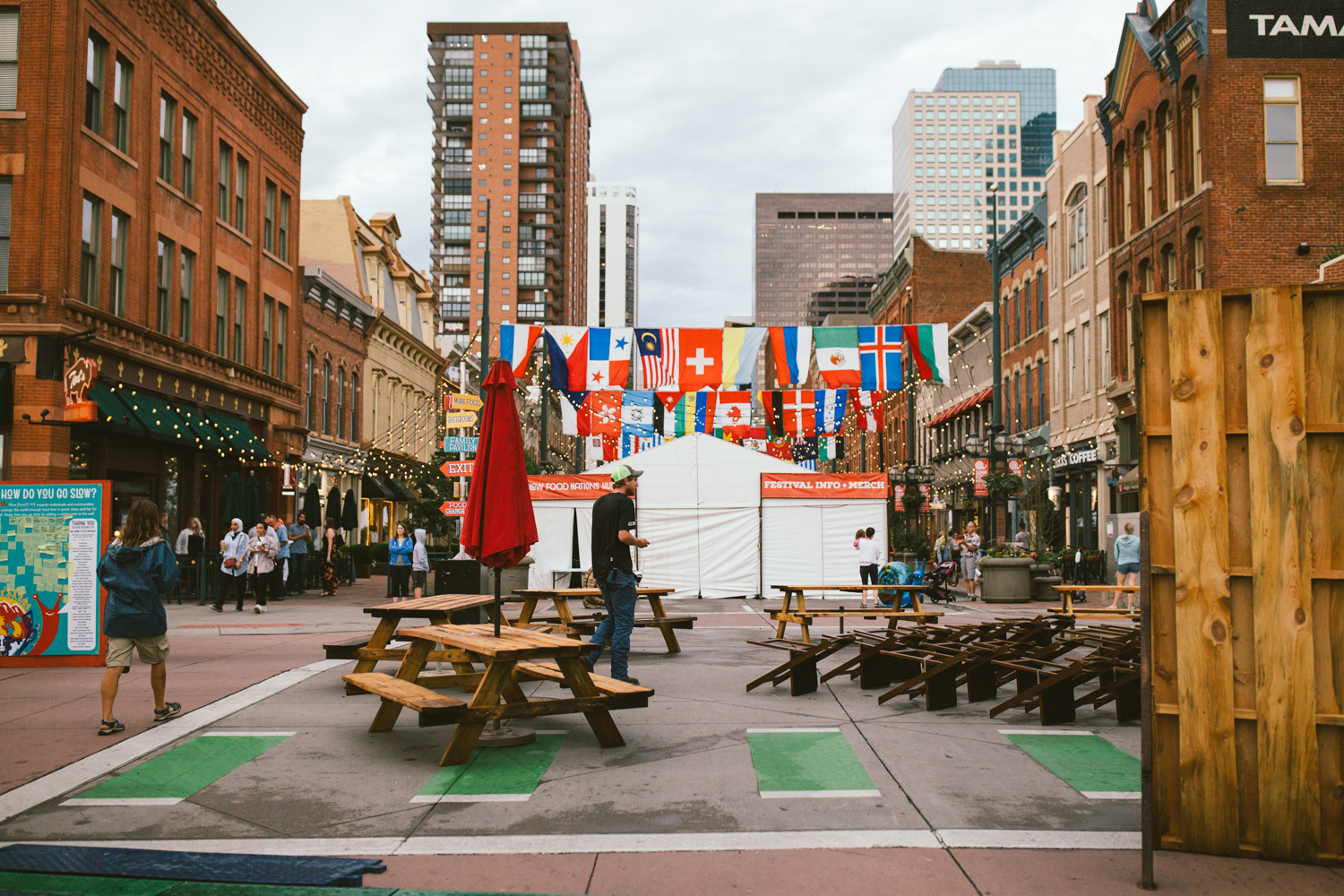Over the weekend of July 19-21, the Slow Food Nations returned to Larimer Square for the third annual iteration. Despite a distinctly Colorado combination of grueling heat and apocalyptic downpours, the festival managed to be one of the more exciting large-scale food events to grace Denver’s packed summer schedule. The festivities — which take over the entirety of Larimer Square — combine education, activism, excellent cuisine and a general sense of public engagement that is hard to find at any major gathering, food or otherwise.
The weekend held an overwhelming variety of free and ticketed cooking demonstrations, panels, live radio broadcasts, book signings, block parties, discussions and lots and lots of local and visiting vendors giving out samples and peddling their wares. With a focus on the organization’s principles of good, clean and fair, the entire event was a celebration of environmental sustainability, equitable practices and the importance of building a considerate food community. The proceedings succeeded in combining what could have been a cacophony of loosely interrelated activities into a cohesive project that continues to clarify its mission with each passing year.
Slow Food has roots in Italy, having been founded by Carlo Petrini in 1986. It has since grown from a grassroots movement combating fast-food culture through the promotion of small business and local production lines to an international organization that strives to participate in all aspects of food justice. Since 2004 the movement has held the biannual conference, Terra Madre — a massive gathering in Turin, Italy expounding the principles on a much greater scale with impressive international involvement. In 2017 Slow Food Nation launched in Denver as the closest thing to the American equivalent. Even in relative infancy, this year’s event had an impressive national draw, with many visitors traveling from across the country to attend.
Board members have been doing a good job of updating the format from one mostly favored by hippies and seed-savers to one that encompasses a larger audience — embracing writers, activists, chefs, business-people and sympathetic consumers — all of whom are equally interested in continuing, developing and expanding the group’s principles. Cooking demonstrations seamlessly integrated discussions about the future of sustainable farming and fishing, a live radio stream broadcasted from the center of Larimer Square — featuring a rotating cast of celebrated contributors including the unimitable Alice Waters — and liquor demonstrations were interwoven with conversations about the agricultural impact of the trade. Complicated and difficult topics were made not only palatable but fun. It was clear that a lot of people came mostly to eat and left inspired to take some kind of action.
Panel discussions and demos occupied several tents along 14th while most of the center of Larimer Square was taken up by several rows of vendors — mostly food companies but also an array of artisans, educators and community organizations. Locals had a strong representation with Park Hill Woodworks, Picaflor Live-Culture, Polidori Sausage, Cooper’s Small Batch, Microtea, Mountain Man Farms and many others all displaying products and offering bites. Vending also included a reasonably-sized national presence with Brooklyn’s Gotham Greens, Minneapolis’ Superior Switchel and Fairfax’s Runamok Maple being just a few of the abundant groups who traveled to be a part of the marketplace. Each day closed with a massive, ticketed block party — Saturday’s Food Over Fire being a celebration of all things grilled and Sunday wrapping up the whole event with a family-style meal using the unused ingredients from across the weekend, the Zero Waste Community Supper.
Food Over Fire was more a more informal gathering, with a variety of local chefs flexing their ability to produce amazing cuisine with local ingredients. Keeping in line with the festival’s ethos, most of the plates and utensils were compostable, and staff was on-hand to direct the flow of waste for anyone who may have been unsure about the correct depository. The Zero Waste Community supper was more illuminating and did a great job of summing up the spirit of the weekend. Steven Satterfield — of Atlanta’s famed organic and seasonal institution Miller Union — and Acreage’s Eric Lee developed the dinner as a way to highlight and address the extraordinary waste produced by most occasions of this scale. Satterfield only agreed to fly out for the event if something was done to combat the unfortunate trend. The two gathered some of the city’s finest, who wound up turning a bunch of materials that would have otherwise ended up trashed into one the weekend’s best meals.
While the activities were manifold, some were more novel than others. Wendy Lu McGill — owner and operator of Denver’s very own insect ranch — and David George Gordon, author of the Eat a Bug Cookbook hosted a seminar on the importance of bugs as a source of protein and their widespread use in global cooking complete with a meal of ants, Oaxacan-style crickets and mealworm borscht. There was insight to be found everywhere. “Things that are delicious are delicious, but ultimately the things we consume have dimension,” Daniel Haykin — of Haykin Family Cider — casually quipped as guests downed flights of cider and discussed the ecology. This was the festival’s greatest strong-suit — it provided environments where people could broach important topics in comfortable and enjoyable contexts.
Each night attendees beamed, toasted and munched under vibrant midsummer sunsets. The atmosphere was one of pure joy. While real concerns about the future of global health and serious contemplation about solutions to the dire and immediate problems we are facing punctuated the whole weekend, the block parties provided an important reminder — food has forever been the engine that drives community, the fundamental fuel that brings people together. While it could be easy to get bogged down by well-founded fears and particulars, the evening’s gatherings — and the festival at large — provided an exuberant display of exactly why it’s all worth fighting for.
All photography by Bridget Burnett.





